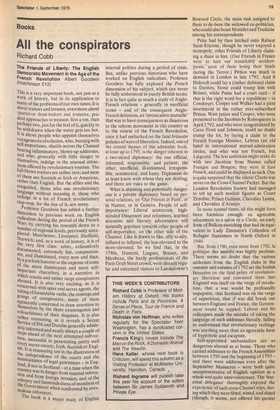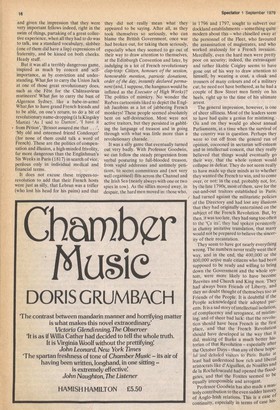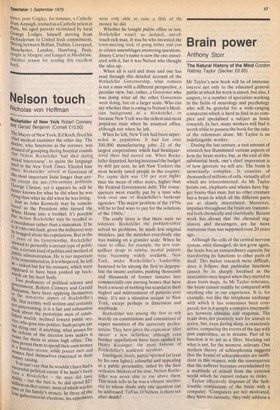Books
All the conspirators
Richard Cobb
The Friends of Liberty: The English Democratic Movement in the Age of the French Revolution Albert Goodwin (Hutchinson £12) This is a very important book, not just as a work of history, but in its application to many of the problems of our own times. It is about traitors and treason, even more about quarter-or derni-traitors and tentative, prudent approaches to treason: first a toe, then Perhaps two, just for the feel of it, quickly to be withdrawn when the water gets too hot It is about people who appoint themselves voYageurs-es-revolution, who, buzzing with self-importance, shuttle across the Channel bearing inflammatory, blown-up addresses, and who, generally with little danger to themselves, indulge in the unusual attractions offered by revolutionary tourism. The full-blown traitors are rather rare; and most of these are Scottish or Irish or American, rather than English. But the sillies and the misguided, those who use revolutionary language without meaning it, those who indulge in a lot of French revolutionary Claptrap, for the fun of it, are many. Professor Goodwin has added a further dimension to previous work on English radicalism during the period of the French Wars by carrying his research 'down to a number of regional levels, previously unexplored: Manchester, Liverpool, Sheffield, Norwich; and, as a work of history, it is of the very first class: sober, exhaustively documented, extremely fair, compassionate, and illuminated, every now and then, by a puckish humour at the expense of some Of the more flamboyant and more self-important characters, in a narrative in Which cranks and rather inept conspirators abound. It is also very exciting, as it is concerned with spies and secret agents, the taking of formidable oaths, the comings and goings of conspirators, many of them aPparently concerned to draw attention to themselves by the sheer extravagance and colourfulness of their disguises. It is also rather reassuring, as it reveals a Secret Service of Pitt and Dundas generally admirably informed and nearly always a couple of steps ahead of the next attempted subversion, successful in penetrating pretty well every secret society, Irish, Scottish or English. It is reassuring too in the illustration of the independence of the courts and the Maintainance of legal guarantees — in England, if not in Scotland — at a time when the country was in danger from internal subversion and from foreign invasion, and of the sobriety and fairmindedness of members of the Government when confronted by overzealous informers. The book is a major study of English internal polities during a period of crisis. But, unlike previous historians who have worked on English radicalism, Professor Goodwin has fully explored the French dimension of his subject, which can never be fully understood in purely British terms. It is in fact quite as much a study of AngloFrench relations — generally in unofficial terms — and of the consequent AngloFrench delusions, an 'intoxication mutuelle' that was to have consequences as disastrous to the reform movement in this country as to the course of the French Revolution, once it had embarked on the fatal brissotin policies of wars of liberation. Indeed, one of the central themes of this admirable book, at least up to 1795, is the danger inherent in a two-tiered diplomacy: the one official, informed, responsible, and patient; the other, unofficial, ill-informed, irresponsible, sentimental, and hasty. Diplomats do at least know with whom they are dealing; and there are rules to the game.
What is alarming and potentially dangerous is a private diplomacy based on personal relations, on 'Our Friends in Paris', or in Nantes, or in Geneva. People of selfimportance: Liberal aristocrats, highminded Dissenters and reformers, learned scientists and literary adventurers will naturally gravitate towards other people of self-importance, on the other side of the Channel. Like is drawn to like, silly to silly, inflated to inflated, the less-elevated to the more-elevated. So we find that, in the 1780s, Dumont, Linguet, Brissot,. and Mirabeau, the hardy professionals of the Paris Grub Street crowd, were already regular and esteemed visitors to Landsdowne's Bowood Circle, the main task assigned to them to de-bore the widowed ex-politician, who could also boast Morellet and Trudaine among his correspondents.
Price had by then latched onto Rabaut Saint-Etienne, though he never enjoyed a monopoly, other Friends of Liberty claiming a share in him. (Our Friends in France were to turn out remarkably accidentprone, most of them losing their heads during the Terror.) Petion was much in demand in London in late 1792. And if Holcroft could lay a (rather dubious) claim to Denton, Stone could trump him with Brissot, while Paine had a court card — if that is the right word for a republican — in Condorget. Cooper and Walker had a joint investment in the rather over-subscribed Petion. Watt junior and Cooper, who were presented to the Jacobins by Robespierre in April 1792, and who were congratulated by Carra Frost and Johnson, could no doubt trump the lot, by laying a claim to the French Foreign Minister, Lebrun (an old hand in international mutual-admiration circles, and who was not French, but Liegeois). The less ambitious might make do with two Jacobins from Nantes called Fra*is. and -Bougon; they were at least French, and could be displayed as such. One is quite surprised that the idiotic Cloots was never on the Cross-Channel Packet. But the London Revolution Society had managed to tot up such modish figures as Count Zenobio, Prince Galitsin, Chevalier Lonza, and Chevalier d'Aranjo.
In more normal times, all this might have been harmless enough: an agreeable adornment to a salon or a Circle, an early form of Balkan-snatching that had its equivalent in Lady Zimmern's Collection of Refugee Statesmen in North Oxford in 1940.
But, from 1790, even more from 1792, la politique des amities was highly perilous. There seems no doubt that the various addresses from the English clubs in the summer and autumn of 1792 set the foolish Brissotins on the fatal policy of revolutionary liberation and convinced them that England was itself on the verge of revolution, that a war would be profoundly unpopular, that Scotland was on the verge of separation, that if war did break out between England and France, the Government would be toppled. Lebrun and his colleagues made the mistake of taking the language of such addresses literally, failing to understand that revolutionary verbiage was anything more than an agreeable form of hyperbole and escapism.
Self-appointed ambassadors are as dangerous abroad as at home. Those who carried addresses to the French Assemblies between 1790 and the beginning of 1793 — and there were addresses even after the September Massacres — were both quite unrepresentative of English opinion as a whole and quite unrevolutionary. The 'fraternal delegates' thoroughly enjoyed the experience of such cross-Channel trips, during which they were feted, wined, and dined (though, it seems, not offered lits geniis) and given the impression that they were very important fellows indeed, right in the swim of things, partaking of a great collective experience, when all they had to do was to talk, use a standard vocabulary, slobber (one of them did have a lisp) expressions of fraternity, and be kissed on both cheeks. Heady stuff.
But it was all a terribly dangerous game, inspired as much by conceit and selfimportance, as by conviction and understanding. What fun to carry the Union Jack at one of those great revolutionary does, such as the Fête for the Chateauvieux mutineers! What fun to carry the bust of Algernon Sydney, like a babe-in-arms! What Jim to have grand French friends and to be able, on one's return, to do a bit of revolutionary name-dropping (a la Kingsley Martin) As I said to Danton', '1 have it . from P6tion', 'Brissot assured me that . . 'My old and esteemed friend Condorcee (for none of them could talk a word of French), These are the politics of compensation and illusion, a high-minded frivolity, far more dangerous than the Englishman's Six Weeks in Paris (1817) in search of vice, perilous only in individual medical and financial terms.
It does not excuse these trippers-torevolution to add that their French hosts were just as silly, that Lebrun was a trifler (who lost his head for his pains) and that they did not really mean what they appeared to be saying. After all, as they took themselves so seriously, who can blame the British Government, once war had broken out, for taking them seriously, especially when they seemed to go out of their way to draw attention to themselves, at the Edinburgh Convention and later, by indulging in a lot of French revolutionary clap-trap: Citizen, honours of the session, honourable mention, patriotic donations, order of the day, instantly declared permanent (and, I suppose, the hangman would be inflated as the Executor of High Works)? The politics of mimicry. No wonder the Reeves cartoonists liked to depict the English Jacobins as a lot of jabbering French monkeys! These people seemed absolutely bent on self-destruction. Most were not active traitors, but they persisted in gabbling the language of treason and in going through with what was little more than a revolutionary charade.
It was a silly game that eventually turned out very badly. With Professor Goodwin, we can follow the steady progression from verbal posturing to full-blooded treason, from vapid addresses and untimely petitions, to secret committees and (not very well organised) flits across the Channel and the Irish Sea (nearly always with one or two spies in tow). As the sillies moved away, in despair, the hard men moved in: those who, in 1796 and 1797, sought to subvert our dockland establishments — something quite modern about this — who chiselled away at the personnel of the Fleet, who favoured the assassination of magistrates, and who worked zealously for a French invasion. Mercifully, even the hard men were pretty poor on security; indeed, the extravagant and rather likable Coigley seems to have gone out of his way to draw attention to himself, by wearing a coat, a cloak and trousers of many colours and of a military cut; he need not have bothered, as he had a couple of Bow Street men firmly on his heels, right up to the time of his ultimate arrest.
The general impression, however, is one of sheer silliness. Most of the leaders seem to have had quite a genius for mistiming. On and on they would go about annual Parliaments, at a time when the survival of the country was in question. Perhaps they were so cut off from the general run of opinion, cocooned in sectarian self-esteem and in intellectual conceit, that they really believed that things would eventually go their way, that the whole system would collapse in defeat. They do not seem really to have made up their minds as to whether they wanted the French to win, and to come over, or not: in the end, probably not, for, by the late 1790s, most of them, save for the out-and-out traitors established in Paris, had turned against the militaristic policies of the Directory and had lost any illusions that they had originally entertained on the subject of the French Revolution. But, by then, it was too late, they had sung too often to the ca ira', they had spoken persistently in clumsy imitative translation, that many would not be prepared to believe the sincerity of their recantation. They seem to have got nearly everything wrong. The numbers never really went their way, and in the end, the 400,000 or the 800,000 active male citizens who had been supposed to be ready and willing to bring down the Government and the whole system, were more likely to have become Reevites and Church and King men. They had always been Friends of Liberty, and they no doubt thought of themselves too as Friends of the People. It is doubtful if the People acknowledged their adopted parents. It is a sad story of intellectual isolation, of complacency and arrogance, of mistiming, and of sheer bad luck: that the revolution should have been French in the first place, and that the French Revolution should have developed in the way that It did, making of Burke a much better historian of that Revolution especially after the October Days — than any of these hopeful and deluded visitors to Paris. Burke at least had understood how rich and liberal aristocrats like d'Aiguillon, de Noailles and de la Rochefoucauld had opened the floodgates, and that the Foxites seemed to be equally irresponsible and arrogant. Professor Goodwin has also made a masterly contribution to the even sadder history of Anglo-Irish relations. This is a case ■Df continuity, especially in terms of case his tones: poor Coigley, for instance, a Catholic from Armagh, trained as a Catholic priest in Paris, his aged parents victimised by local Orange Lodges, himself moving from Defenderism to United Irish commitment, flitting between Belfast, Dublin, Liverpool, Manchester, London, Hamburg, Paris, caught in Margate and hanged at Maidstone. Another reason for reading this excellent book.
































 Previous page
Previous page